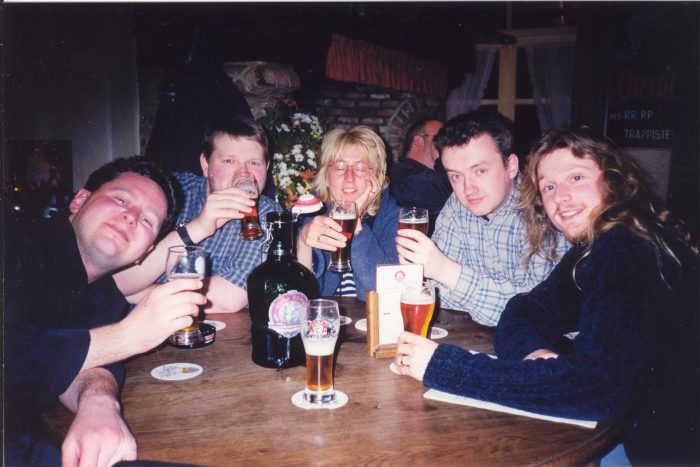Summer held so much promise for me as a proud drinker of alcoholic beverages.
I loved all the little three-day-weekend type holidays. Memorial Day, Independence Day, and Labor Day all meant one thing—unlimited beer and booze consumption disguised as celebration and fully endorsed by social conventions. I could drink all day, and my addiction would hide effortlessly in plain sight.
When I had concerns about my drinking, even when I knew I had a significant problem and had exhausted all attempts at moderation, I would never dream of quitting drinking in the summer. Not only did the warm sun provide the best occasions for overconsumption, but the summer also meant the most consistent exposure to friends and neighbors—other drinkers drinking. I couldn’t possibly manage the shame of being the only guy at the party without a beer in my hand. Unthinkable.
If I was going to quit drinking, the summer wasn’t the right time. So, I kept on suffering my alcohol-induced depression and anxiety for another season.
I couldn’t quit before Halloween. Following my kids around the neighborhood with my travel coffee mug full of beer was one of the highlights of my year. I loved the interaction with neighbors, the occasional refill at the houses of friends. Halloween was such a festive night. I couldn’t possibly quit before the end of October. The pain and suffering would have to continue.
Drinking during football season wasn’t medicinal. It was obligatory. What red-blooded American could quit drinking once the pigskin started flying. Then there was Thanksgiving with beers after the neighborhood soccer game. I had a buzz going before the Macy’s Thanksgiving Day Parade was over, and long before the turkey started roasting.
I couldn’t even consider sobriety before Christmas. So many parties. So many impromptu neighborhood gatherings. So many chances to make just a little bit of an ass of myself in front of people who would forget my behavior before next December, and time to do it all again. Sobriety could wait. It would have to wait, because the holiday season was no time to quit. I would just have to soak my alcoholic anguish in whiskey-spiked eggnog.
How about January or February? Gross! I couldn’t quit drinking during those first two dark and frigid months of the year. Even the happiest of people face seasonal depression under those conditions. Alcohol was my coping mechanism to start every year. The suffering and medicating would have to continue.
St. Patrick’s Day is in March, and I’m 12.5 percent Irish. Enough said. I couldn’t quit drinking in April because summer was right around the corner. I had to drink in celebration of surviving another winter of alcohol-induced depression.
Now, take my seasonal reasons for avoiding the inevitable, and multiply them by a zillion for all those suffering through hidden but inescapable high-functioning alcoholism during this pandemic. What a terrible time to try to quit. So much unknown. So much economic chaos. So much isolation. So much boredom. What are four of the top reasons we drink in this culture? Anxiety, fear, loneliness, and lack of anything better to do, right? So quitting drinking during COVID-19 is out of the question. It will have to wait until things settle down and return to normal.
If I was still a drinker, this is the logic I would be using. Does it sound familiar?
Dr. Fauci, America’s leading expert on the pandemic and our national response, is on record as hoping for a 70-75 percent effectiveness rate for the coronavirus vaccine when it is ready sometime next year. That means if you are playing euchre with three other people who have all received the vaccine, one of you is still susceptible to the virus.
Furthermore, I heard today a cable news report that a recent survey reports one in three Americans will refuse to take the vaccine when it is ready. The next time you are socially distanced standing in line at the grocery store, look at the person in line in front of you. Now, turn around and look at the person with the cart six feet behind you. One of you three chuckleheads isn’t going to get vaccinated, screwing up the herd immunity for all of us.
If you are waiting for COVID-19 to “blow over” before you quit drinking, think about those statistics for a minute. Next year sometime, something will be available to protect most of us from the virus, but only just a few more than half of us will take it. It doesn’t sound to me like the end of the crisis is coming any time soon. How about you? Alcohol abuse is not known for giving people optimistic attitudes.
If you are waiting for the end of the pandemic to quit drinking, are you sure you can survive the depression, anxiety, chaos, and trauma alcohol is delivering to your life long enough?
I was a heavy drinker for 25 years, and a high-functioning alcoholic for 10. I have been sober for three and a half years now, and if there’s one thing all of that time battling this disease has taught me, it’s this: there is clearly a best time and a worst time to quit drinking alcohol. The best time is now. The worst time is later, because it might just be too late.
Alcoholism is a progressive disease. If you question your drinking now, the progress can only go in one direction. If you drink too much today, you’ll be amazed to see how much you drink when you allow yourself to drink, and the damage drinking will have done to your life in years to come. You can believe me and the millions of alcoholics who universally agree with that statement, or you can try to be the first ever alcoholic to learn to control the uncontrollable. I sure tried hard and wasted a ton of time, so I’d understand if you push stubbornly ahead.
The internet is full of 20 question self-diagnosis surveys designed to help people understand their relationships with alcohol. It really is quite a bit easier than that. There are only two questions you need to ask yourself if you want to understand where alcohol fits in your life.
1. Do you think about alcohol when you’re not drinking—either regret from the last drinking session or anticipation of the next?
2. Is alcohol having a negative impact on your life (small issues or large issues or both)?
If you answer “yes” to both of those questions, I’ve got some really good news for you: you can stop trying to decide if you are an alcoholic. You can stop trying to moderate and control your consumption. You can bring an end to the mental gymnastics of trying to figure out how to address your problem. Your choice is far simpler than you are making it. You can quit drinking alcohol, or you can make your life progressively worse until alcohol kills you.
Whoa, that’s harsh. What a buzzkill, right? Here you are, just drinking more than usual, while you try to wait out a pandemic that might never truly end. What’s wrong with that? Why do I have to be so definitive and unwavering?
A huge part of my recovery from alcoholism, a massive chunk of who I am, is my devotion to helping others from suffering the same pain and wasted time that I suffered. Look, you can start the gruelling process of recovery now, or you can start it next decade. It will be hard either way. The only question is, how much time are you willing to waste wasted?
This new abnormal isn’t going away anytime soon, and your drinking will never get better no matter how hard you try.
When is the best time to quit drinking alcohol? The best time is now.
~ If you’d like to learn how I quit drinking alcohol, please read my free Guide to Early Sobriety.
~

 Share on bsky
Share on bsky







Read 4 comments and reply